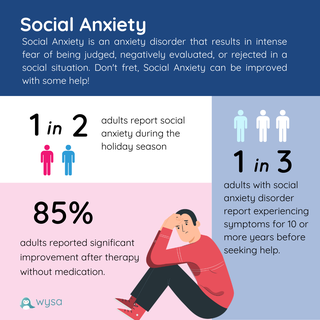In our last article I talked about emerging from COVID and some of the adjustments that we must make along with practicing patience. I had over 100 likes, comments, and hearts. I also received more than one comment related to social anxiety. It sounded like the perfect next article.
What is Social Anxiety?
Social anxiety is the reluctance to participate in everyday activities with other people; activities you would normally enjoy. It can take the form of worry, feeling awkward or not belonging, afraid of making a mistake, or even fear of embarrassing yourself around others. Therefore, it is clear that social anxiety can manifest in a number of ways.
Social Anxiety is at a Peak
While the pandemic might not be over, many people are trying to transition back into the so-called “normal way of life. “Re-entry anxiety is normal for everyone,” said Hillary Ammon, PsyD, an assistant professor of clinical psychiatry in the Perelman School of Medicine at the University of Pennsylvania.
“The most obvious symptoms to look for include experiencing severe discomfort in social situations and the choice to avoid social outings,” Ammon said. “Often this discomfort or avoidance is fueled by fears of being judged or embarrassed. You may also notice physical symptoms, such as a racing heart, sweating, nausea, dizziness, and feeling flushed in social situations.” Ashley Welch, healthline.com
For most people it’s normal to struggle with change. The self imposed social distancing we have been through in the last couple years was hard and now re-entering the work force or family gatherings and yes maybe grocery shopping in person presents more change and it will be harder for some than for others. Also, there is no one size fits all. Remember, we feel things for a reason. Fear is a normal response most of us have every day and anxiety comes from that fear.
Conquering Social Anxiety
In addition to realizing what we are feeling is normal how do we get back to feeling in control and more like our old selves?
First think through your fears and figure out what exactly it is that’s causing concern. Take that amorphous blob and give it a name. Once you can name it you can then think through ways to deal with it, take time and come up with a game plan. Take back control.
Social skills are just like any other skill, they get rusty with disuse. So just begin small. Walk in the park and say hello, meet a good friend for lunch on a patio, talk to grocery clerk even if it’s just about the weather. Practicing your social skills will be a first step to overcome anxiety.
Plan plan plan. I always tell my clients to have 2-3 topics of conversation and a wing man if they are nervous going into a social situation. The best way to dispatch fear is to be prepared (within reason.) Also have an exit plan prepared. Have a way out before going in. Have a call, have to go see a friend under the weather, what ever makes sense.
More Tips
Remember what has worked in the past. If you find your anxiety rising stop and take a few breaths. Focus on your breathing or on a fixed point and regain control. Change your perception. Don’t focus on what was, focus on the good things that will result from this change.
Take care of you. If you are not at your best physically it’s harder to be in control mentally.
Further, you can make some lifestyle changes if you need to, including regular exercise, a greater focus on quality sleep, and the introduction of mindfulness into your routine. Eat well and watch alcohol intake.
You do you. No one’s comfort levels and end goals are going to be the same. So aim for progress, not perfection. Check in with yourself periodically, if you hit a milestone celebrate. Journal your progress so you can see how far you have come and also keep track of what is working and what is not.

If You Need Help…
Ask for help. If the anxiety persists, there is a point when you should seek professional help. After all, research tells us that one-third of Americans are showing signs of clinical depression or anxiety. Is the anxiety debilitating? Is it impacting you living the life that you want? Does this happen for multiple days and or multiple events? If the answers are “yes”, these are probably signs that point to involving a professional.
If overcoming social anxiety is your goal, then making and following your preplanned action steps can help get you to where you want to go. The above information are some ideas to get you started. You’ll know you’re making progress when you feel a little bit of anxiety about the prospect of doing something, but not so much that it actually prevents you from doing it.
Related Article: COVID Coma
* Please leave a comment below. You may comment anonymously or you may use your first name. We may post or quote your comment on the website. We will never post or share your last name, email address or any other personal identifying information.

Oh my goodness! Amazing article dude! Many thanks, However I am having troubles with your RSS. I don’t understand the reason why I cannot subscribe to it. Is there anybody getting identical RSS issues? Anybody who knows the answer can you kindly respond? Thanx!!
https://tecna.es/?option=com_k2&view=itemlist&task=user&id=7297
Thanks for the comment. Our RSS feed seems to be working. I just looked at it on the Feedly reader. I am no expert on RSS though. I hope you will let us know if you figure out what the problem is.